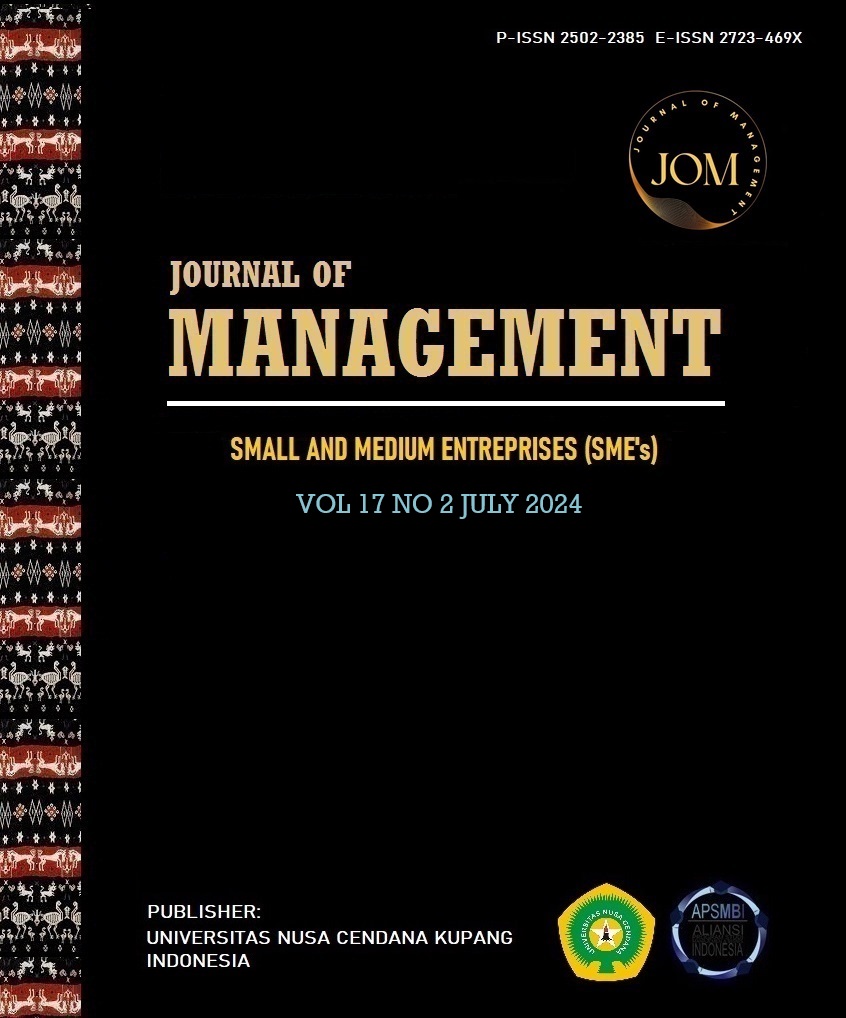THE PERCEPTION OF SECURITY AND RISK, EASE OF USE, AND BENEFITS ARE THE DETERMINING FACTORS IN ADOPTING A DIGITAL WALLET
Abstract
The COVID-19 era is an event that transitions all human activities in all parts of the world. This has an impact on various aspects including health, economic, and social aspects. All activities are carried out indoors and limit contact outside the room to avoid COVID-19, from social distancing to working from home. The implementation of this system makes people more 'literate' in technology. One of them is in the economic sector, where people have started using non-cash payment transactions. Because of this phenomenon, researchers analyzed the perception of security and risk, and benefits as the determining factors of in adopting the digital wallet. This research uses interviews and direct observation. The data collection was carried out on 15 respondents, people who have a high interest in the use of digital wallets. The results show that perceived security, ease of use, and benefits are the main factors in digital wallet adoption. Users prefer platforms with security features such as encryption and two-factor authentication. Perceived risks, such as data loss, can be mitigated with good education. Ease of use through an intuitive interface increases user satisfaction. Benefits such as ease of payment and financial incentives are strong motivators. To increase adoption, providers should focus on security, convenience, and clear communication of benefits.
Keywords: Digital Wallet; Security and Risk; Benefits
Downloads
References
https://doi.org/https://doi.org/10.29303/jseh.v6i1.78
Bruce, B. C., & Hogan, M. P. (n.d.). The disappearance of technology: Toward an ecological model of literacy. In Writing in a Technological World, 191–207. https://doi.org/https://doi.org/10.4324/9780429507014-14
Campbell, S., Greenwood, M., Prior, S., Shearer, T., Walkem, K., Young, S., Bywaters, D., & Walker, K. (2020). (2020). Purposive sampling: complex or simple? Research case examples. Journal of Research in Nursing, 25(8), 652–661.
https://doi.org/https://doi.org/10.1177/1744987120927206
Creswell, J. W. & Creswell, J. D. (2023). Research Design: Qualitative, Quantitative, and Mixed Methods Approaches 6th Edition. United States of America: Sage Publication, Inc. https://doi.org/https://doi.org/10.4135/9781529614572.n50
Fawzi, M. (2022). Pengaruh Kemudahakan Penggunaan, Risiko, Kepercayaan, dan Efisien Terhadap Minat E-Wallet Saat COVID-19. Jurnal Ilmu Dan Riset Akuntansi, 11(9), 1–23. https://doi.org/https://doi.org/10.55681/economina.v3i1.1141
Hadi, F., & Gandryani, F. (2022). ). Status Darurat Kesehatan Akibat Pandemi Covid-19 Dalam Perspektif Hukum Tata Negara Darurat Di Indonesia. Arena Hukum, 15(3), 582–609. https://doi.org/https://doi.org/10.21776/ub.arenahukum.2022.01503.7
Jeong, I., Jean, R.-J. B., Kim, D., & Samiee, S. (2022). Managing disruptive external forces in international marketing. International Marketing Review, 40(5), 936–956. https://doi.org/https://doi.org/10.1108/imr-12-2021-0381
Kallio, H., Pietilä, A., Johnson, M., & Kangasniemi, M. (2016). Systematic methodological review: developing a framework for a qualitative semi‐structured interview guide. Journal of Advanced Nursing, 72(12), 2954–2965.
https://doi.org/https://doi.org/10.1111/jan.13031.
Rahmi, S., Ilyas, G. B., Tamsah, H., & Munir, A. R. (2022). Perceived risk and its role in the influence of brand awareness on purchase intention: study of Shopee users. Jurnal Siasat Bisnis, 26(1), 97–109.
https://doi.org/https://doi.org/10.20885/jsb.vol26.iss1.art7
Samudro, E. G., & Madjid, M. A. (2020). Pemerintah Indonesia Menghadapi bencana nasional COVID-19 yang mengancam ketahanan nasional. Jurnal Ketahanan Nasional, 26(2), 132–154. https://doi.org/. https://doi.org/10.22146/jkn.56318
Shin, S., & Miller, S. (2022). A Review of the Participant Observation Method in Journalism: Designing and Reporting. Review of Communication Research, 10. https://doi.org/https://doi.org/10.12840/issn.2255-4165.035.
Sugiyono, P. D. (2013). Metode Penelitian Kuantitatif, Kualitatif, dan R&D. In Bandung: Alfabeta.
Sutresna. (2013). Intention To Use Digital Payment During The COVID-19 Pandemic In The Rural Area. . . Jurnal Ilmiah MEA (Manajemen, Ekonomi, Dan Akuntansi), 7(3), 135-144. https://doi.org/https://doi.org/10.31955/mea.v7i3.3218
Taherdoost, H. (2022). What are Different Research Approaches? Comprehensive Review of Qualitative, Quantitative, and Mixed Method Research, Their Applications, Types, and Limitations. Journal of Management Science & Engineering Research, 5(1), 53–63.
https://doi.org/https://doi.org/10.30564/jmser.v5i1.4538
Taqi, H. Md. M., Ahmed, H. N., Paul, S., Garshasbi, M., Ali, S. M., Kabir, G., & Paul, S. K. (2020). Strategies to Manage the Impacts of the COVID-19 Pandemic in the Supply Chain: Implications for Improving Economic and Social Sustainability. 12(22), 9483. https://doi.org/. https://doi.org/10.3390/su12229483
Tashia, V. K., & Widuri, R. (2023). Acceptance Of Information Technology In Internal Audit Professionals: Impact Of Technology On Companies In Jabotabek. Jurnal Ilmiah Manajemen, Ekonomi, & Akuntansi (MEA), 7(1), 794–812.
https://doi.org/https://doi.org/10.31955/mea.v7i1.2812
Umaroh, R., & Vinantia, A. (2018). Analisis Konsumsi Protein Hewani pada Rumah Tangga Indonesia. Jurnal Ekonomi Dan Pembangunan Indonesia, 18(3), 22–32. https://doi.org/https://doi.org/10.21002/jepi.2018.13
Vamathevan, J., Clark, D., Czodrowski, P., Dunham, I., Ferran, E., Lee, G., Li, B., Madabhushi, A., Shah, P., Spitzer, M., & Zhao, S. (2019). Applications of machine learning in drug discovery and development. Nature Reviews Drug Discovery, 18(6), 463–477. https://doi.org/https://doi.org/10.1038/s41573-019-0024-5
Wolff, K., Larsen, S., dan Øgaard, T. (2019). How to define and measure risk perceptions. Annals of Tourism Research, 70, 1–9.
https://doi.org/https://doi.org/10.1016/j.annals.2019.102759
Yanti, L. R., Isnaeni, N. dan R. (2023). Analisis Faktor-Faktor Penggunaan Dompet Digital (E-Wallet) sebagai Alat Transaksi di Tinjau dari Perspektif Ekonomi Islam. Journal of Islamic Economic and Finance, 3(3), 157–167.
https://doi.org/https://doi.org/10.20527/jiep.v4i1.3556

 Karsim Karsim(1*)
Karsim Karsim(1*)



